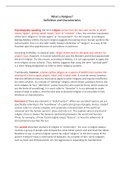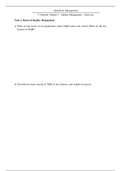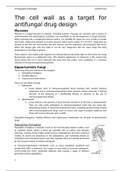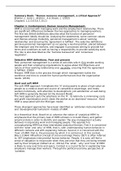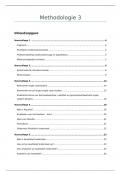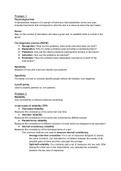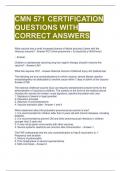Business Law
Semester 1
, S.U. 1:
History & Sources of SA Law
SA Legal History Periods:
1. Roman Law
2. Roman Dutch Law
3. South African Law
1. Roman Law
Period of the Kings 753BC-510BC
- customary law (community was primitive & rural therefore legal rules consisted
mainly of customs)
Republican Period 510 BC – 27 BC
- 12 Tables (roman law was written down for the first time in the form of 12 tables)
Period of the Emperors 27BC – 284 AD
- Significant development (Roman legal system reached its peak)
Post-Classical Period 284 AD – 565 AD
- Decline of the legal system (due to the divide of the western and eastern
empires)
Corpus Iuris Civilis: codification of the roman law which occurred in 476 AD when the Germanic tribes
conquered the western empire which led to social and economic decline. The codification consisted of:
- Codex: a collection of legislation
- Digesta: selections of the works from roman jurists
- Institute: textbooks for students
- Novellae: a collection of the legislation promulgated after the completion of the codex
2. Roman – Dutch Law
(Combination of the Law of the Netherlands and the Roman Law). Its principles were adopted and applied and
because of the canon (clerical) law (based on roman law), it played a predominant role. Law of Netherlands
consisted mainly of Germanic customary laws)
3.South African Law
1652 – Jan van Riebeek came to South Africa. He brough Roman Dutch Law which still todays forms the bases of
South African Law and is better known as South African common law. It has a strong influence of English Law
, which was introduced into South Africa during the British occupations of the territory. The influence of English law
on our own law was caused by the following factors:
- English judges and magistrates presided in the South African courts.
- Local jurists studied in England.
- English decisions were applied by the South African courts.
- South African legislation was modelled on English legislation.
Because of the unique demands of our society, the principles received from both the English and the Roman-
Dutch law were modified over the years by legislation, court decisions and indigenous customary law to form what
is today a unique South African legal system. The South African law is not codified, which means that it is not to
be found in toto in legislation, although some fields, for example, the law of insolvency, have been codified.
4.The South African Legal System
Law Rights
- The law consists of rules that the community Right: the legally protected interest of a legal subject (person)
must adhere to, that are intended to regulate in a legal object or a thing (such as a house or a car), which
society in an orderly way. interest can be protected or enforced against other legal
- The law is enforced by the state (when a law is subjects.
disobeyed, the state can intervene and order
compliance, penalize or punish the offender.) - Real right: the right to a corporeal thing, the right
- Legal rules can be of a coercive (peremptory) or being effective against all the world (for example,
regulatory nature. ownership in property).
- Regulatory law: allows the party freedom to - Personal right: a right that entitles one person to
regulate their own relationships and will only claim performance of some act or delivery of some
apply if the parties choose to comply with the thing from another, which right is created by a contract
rule. or by a wrongful act. (e.g. being paid for your work –
- Coercive (peremptory): it forces the party to salary. Assault)
comply with certain prescriptions contained in - Intellectual property right: the right of a person to the
the rule. (speed limit) creations of his/her mind or intellect (for example,
copyright or trade mark).
- Personality right: the right of a person to aspects of
his/her personality (such as dignity, bodily integrity,
honour, good name, and so forth).
, Legal Subject: any entity who, in terms of the law, can be the
bearer of rights and duties. Legal subjects can be divided into
two groups:
- Natural persons: Every human being is a natural
person and is recognised as a legal subject from the
moment of birth until the moment of death.
- Juristic persons: A juristic person (for example, a
company) is also a legal subject. A legal object, on the
other hand, is that which forms the object of an interest
(a right) protected by law.
5.Creation of the Rules of Law
1. Custom as a source of law
2. Legislation as a source f law
3. Court decision as a source of law
5.1. Custom as a source of law
Custom: A custom can become so entrenched that it creates an unwritten legal rule, or abolishes an existing
legal rule. A custom must meet the following requirements before it can be recognised as an enforceable legal
rule:
▪ It must be reasonable.
▪ It must have existed for a reasonably long time.
▪ It must have been generally accepted and complied with by the community within which it applies.
▪ The contents of the rule must be clear and certain.
(e.g. Business hours: Merchants were trading & observed working hours. This then became a custom that they
would trade 8am-5pm Mondays to Fridays which is now observed everywhere in the world.)


